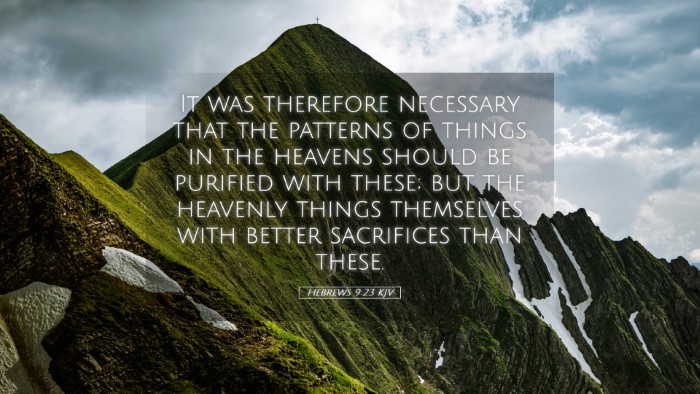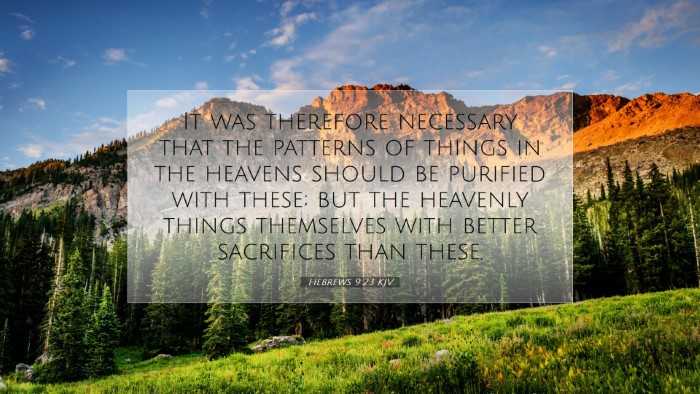Commentary on Hebrews 9:23
Hebrews 9:23 states: "It was therefore necessary that the patterns of things in the heavens should be purified with these; but the heavenly things themselves with better sacrifices than these."
Introduction
This verse holds a pivotal place in the theological understanding of the relationship between the old covenant practices and the new covenant fulfilled in Christ. The author of Hebrews compares the sacrificial systems and the heavenly realities they signify, emphasizing the superiority of Christ's sacrifice.
Contextual Analysis
- Literary Context: The book of Hebrews discusses the superiority of Christ and the new covenant over the old. This chapter specifically focuses on the implications of Christ's sacrificial death in contrast to the Old Testament sacrificial system.
- Theological Context: The notion of purification and sacrifice is deeply rooted in the Jewish tradition, where earthly sacrifices were seen as a shadow pointing towards a spiritual fulfillment in Christ.
Insights from Matthew Henry
Matthew Henry underscores the importance of Christ's role as the great High Priest. He elucidates that the 'patterns' refers to the earthly tabernacle and its services, which served as a foreshadowing of the heavenly realities. Henry notes:
"The sacrifices appointed under the law were types and shadows, which, when the substance came, were no longer necessary. It was necessary that the heavenly things themselves should be purified; these refer to the heavenly sanctuary where Christ has entered with His own blood."
Thus, Henry emphasizes, the need for a 'better sacrifice' is fulfilled in Christ, whose blood purifies not just outer rituals but addresses the heart of humanity.
Insights from Albert Barnes
Albert Barnes offers a rich exposition of the terms "patterns" and "heavenly things." He explains that:
- The patterns denote the tabernacle and its services, which are merely copies of a greater reality.
- Heavenly things refers to Jesus Himself, His ministry, and the eternal redemption He offers.
Barnes argues that the verse fundamentally directs readers away from the physical rituals of the Old Testament, signaling a transformative pivot to the spiritual essence embodied in Christ. He writes:
"The sacrifices and purifications made under the law were inadequate; it was necessary for the higher, celestial realities to be approached with a sacrifice of infinite value—namely, that of Christ."
Insights from Adam Clarke
Adam Clarke highlights the theological implications of this verse by noting the significance of the 'better sacrifices.' He comments on the absolute necessity of Christ’s sacrifice for the redemption of humanity, explaining:
"Under the old covenant, the high priest entered the holy places with the blood of animals; however, Jesus entered the true sanctuary with His own blood, establishing eternal redemption."
Clarke articulates that this contrast accentuates the divine plan of salvation, where Christ’s atoning work elevates believers into communion with God, transcending the limitations of the Old Testament practices.
Theological Implications
Hebrews 9:23 gives profound insight into the New Testament teaching about sacrificial atonement and the nature of Christ's work as High Priest:
- Purification: This verse speaks to the necessity of purification—without it, man cannot approach God. The earthly temple's rituals pointed towards the need for greater cleansing.
- Heavenly Reality: Believers are called to comprehend the heavenly as a superior and eternal reality that is fulfilled through Christ's sacrifice.
- Transcendence of Christ: The phrase 'better sacrifices' reminds us that deeds done in shadow cannot fulfill divine justice; only Christ's perfect sacrifice can.
Practical Applications
The exposition of Hebrews 9:23 reveals numerous pertinent applications for pastors, students, and theologians:
- Understanding Atonement: The nature of atonement is critical; students of the Word should deep dive into how Christ's sacrifice fulfills and transcends previous sacrifices.
- Communion with God: This verse encourages believers to recognize the access they have to God through Christ's sacrificial work, promoting a lifestyle of intimate worship.
- Teaching and Preaching: Pastors and teachers should strive to convey the significance of the sacrificial system's fulfillment in Christ, helping congregations grasp the depth of salvation offered.
Conclusion
Hebrews 9:23 invites reflection on the richness of the Christian faith and the central role that Christ’s sacrifice plays in the life of believers. It is a call to move beyond mere ritual observance into a genuine relationship with God through the perfect atonement achieved by Jesus. As believers and scholars engage with this text, let them be reminded of the profound implications of Christ's superior sacrifice, and the transformative access to the divine it affords.


